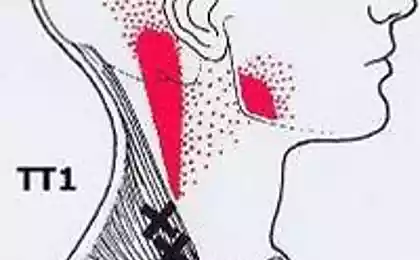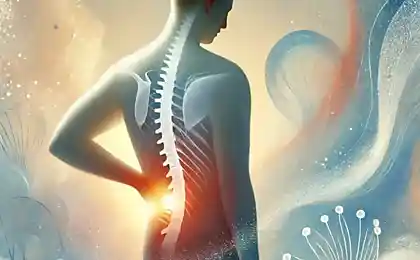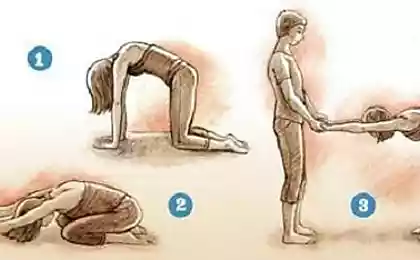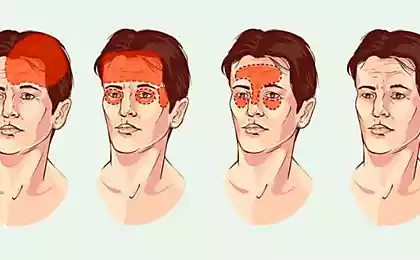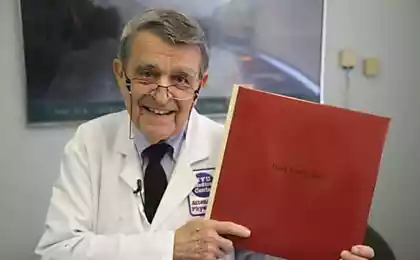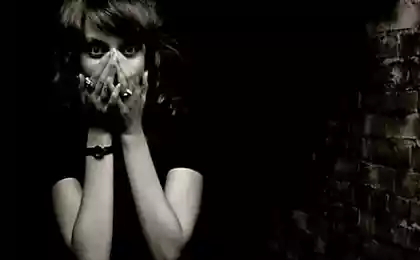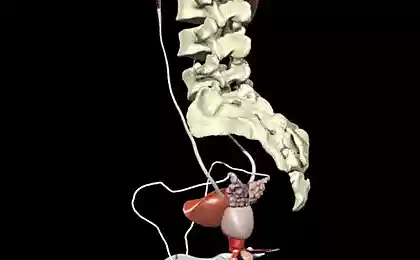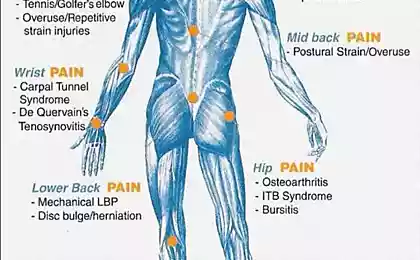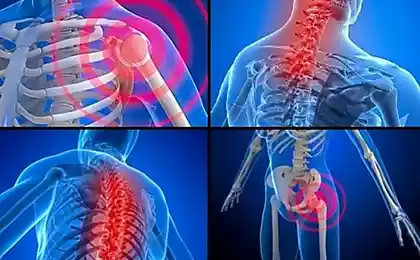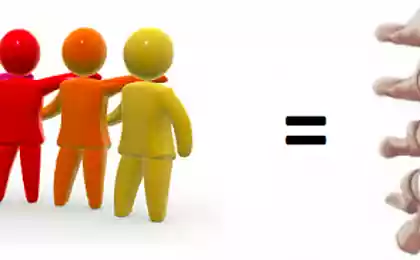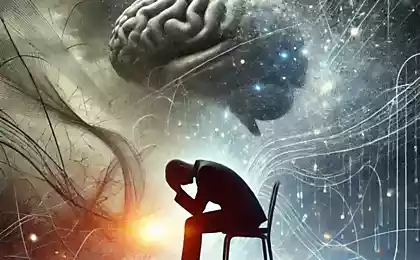549
Psychological roots of spinal problems
A stiff and crunchy neck, aching lower back or constant voltage between the shoulder blades – the satellite office workers, Housewives, and sometimes even students hunched over textbooks.
But if you follow the posture, gymnastics and abandoned the heavy bags and back still hurts – maybe it's a reason to go to a psychologist or to look inside yourself.
The fact that our back is first to react to stress, anxiety, guilt and other negative emotions. Location of pain will help you understand what problems do not allow you to go through life with a straightened back.
The fact that our body like the brain responds to anxiety, resentment, guilt and other negative emotions. The first reaction to any stress, inherent in us by nature, to attack or to flee. And the muscles tense, as if preparing for fight or flight: we are unable to involuntarily clench his jaw, clench his fists, clench my toes, straining certain parts of the body.
But first to stress the so-called paravertebral react (okolofutbolnye) back muscles. And there are back problems that have psychological roots, but it is noticeable physically manifested in the form of tension, pain and crunch. The localization of unpleasant sensations will help you to understand the problems in what area of life is the source of back problems.
The neck connects the head to the trunk, and along the world of our feelings, ideas and thoughts with the real world. Problems in the cervical spine can be a result of lack of flexibility, including flexibility and inner.
Perhaps the established order of things has long you got bored. You dream about change, but is stuck in familiar rut and cannot get out of there. Convulsions, rigidity of the neck may arise from fears: afraid to see what you do not want to know, you seem to be afraid to look around or look back.
Universal reflex of almost all mammals in danger to pull his head into his shoulders. Problems with the neck in this case can be, for example, problems at work or anxiety about the future.
The last cervical vertebrae – the largest in this Department, they provide support to a head. You may experience discomfort in this area, if you put extra obligations, and someone uses your service and doesn't give anything in return. The saying "sitting on my neck" our body feels literally: there are clamps and strain in the region of the sixth-seventh cervical vertebrae.
Thoracic, especially its upper part, responsible for emotions – because in the chest is the heart. If your back pain just below neck and above waist, ask yourself: did you hurt anyone, not if you moved recently, the loss of a loved one, job, pet?
Some people who suffer from pain in the thoracic spine, bad contact with your feelings. They prefer to act and to listen to the voice of the heart and Express your emotions can't. Only actions and tangible achievements make them feel worthy of love and respect significant people.
Clips shoulders and the thoracic spine, stoop, often occur in those who are not confident in their own attractiveness. Man as if trying to shrink, to become invisible, to occupy as little space as possible. A sense of shame for themselves, embarrassment, shyness, stemming from low self-esteem, can not only tear your soul, but your back in the chest Department.
In lumbar Department are most powerful, wide vertebrae. He "carries" his greatest effort. And when we saddled with too many problems, the first in this situation reacts back.
Back pain can signal a lack of support from his family, colleagues, and superiors. This can be uncertainty – but if the pain is in the thoracic spine often associated with emotional problems, discomfort in the lower back usually due to social fears: being without money, not to take the exam, do not write the diploma...
The pain may worsen in case of failure in response to a request for assistance – for example, when you ask to borrow from relatives, and they refused, or ask the husband to help with household chores, and he said that it is "women's work".
The sacrum is the pelvis, it symbolizes freedom – freedom of decisions, actions, sexual emancipation. Trouble in the sacral region of the spine can be an indicator of sexual problems, e.g. sexual dissatisfaction or incompatibility with the partner, resentment at him.
The feeling of stiffness from the fact that the events (in the family, at work, in personal life) are developed not so, as we, too, can cause discomfort in the sacrum. People seemed to lose his freedom, his plans are broken, and there's nothing he can do about it. Pain in this region often experience people who are afraid to be helpless in the face of problems (whether it happened in reality or not).
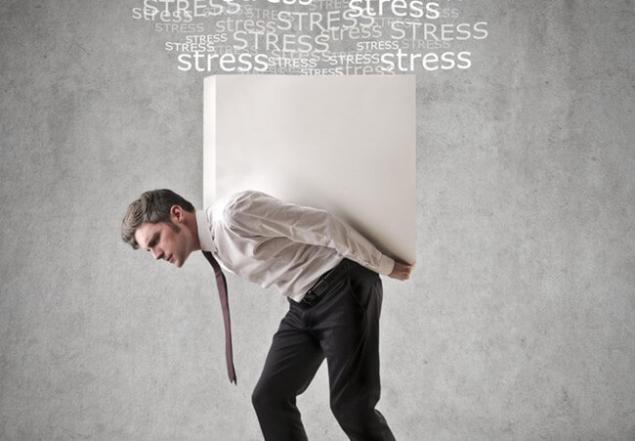
Fear of death is another cause of pain in the sacrum. Death is the natural end of every life, but in our culture this topic is taboo, and that fear of death increases. People, afflicted with fear of dying or losing something – a loved one, job, financial well – being can suffer pain in the sacral region of the spine.
Coccyx - the end of the spine consisting of five fused vertebrae. Pain it most often appears in a sitting position, while lowering into a chair or standing up with it. The psychological roots of problems with tailbone about the same, and discomfort in the sacral region Department: thoughts on the threat to health or life, the dissatisfaction of our basic needs, sexual dissatisfaction, dissatisfaction with one's own body, the thought of that man in some way disadvantaged by fate and family.
It can also be compounded by a sense of shame for its own passiveness: no wonder the pain in the coccyx appears when sitting on the chair. Like, I'm just sitting here, when I have to run and do something. Allow yourself to be weak, to accept and ask for help — what we don't know these people.
PSYCHOSOMATICS — the-Shoulder: a contradiction between what we NEED and what we really WANTour thoughts attract in life WHAT we think
In conclusion, I should add that the psychological and physical problems with the spine can be combined. There are cases when people do not receive help from loved ones, "accidentally" injure the coccyx or the sacrum, and the one who takes on too much of other people's problems, found a cervical osteochondrosis.
The knowledge of possible psychological causes of your ailment will not replace a trip to the doctor, but it will help to understand in what area of life you need to "relieve" themselves.
Author: Alex Carinci
P. S. And remember, only by changing their consumption — together we change the world! ©
Source: www.b17.ru/article/14261/
But if you follow the posture, gymnastics and abandoned the heavy bags and back still hurts – maybe it's a reason to go to a psychologist or to look inside yourself.
The fact that our back is first to react to stress, anxiety, guilt and other negative emotions. Location of pain will help you understand what problems do not allow you to go through life with a straightened back.
The fact that our body like the brain responds to anxiety, resentment, guilt and other negative emotions. The first reaction to any stress, inherent in us by nature, to attack or to flee. And the muscles tense, as if preparing for fight or flight: we are unable to involuntarily clench his jaw, clench his fists, clench my toes, straining certain parts of the body.
But first to stress the so-called paravertebral react (okolofutbolnye) back muscles. And there are back problems that have psychological roots, but it is noticeable physically manifested in the form of tension, pain and crunch. The localization of unpleasant sensations will help you to understand the problems in what area of life is the source of back problems.
The neck connects the head to the trunk, and along the world of our feelings, ideas and thoughts with the real world. Problems in the cervical spine can be a result of lack of flexibility, including flexibility and inner.
Perhaps the established order of things has long you got bored. You dream about change, but is stuck in familiar rut and cannot get out of there. Convulsions, rigidity of the neck may arise from fears: afraid to see what you do not want to know, you seem to be afraid to look around or look back.
Universal reflex of almost all mammals in danger to pull his head into his shoulders. Problems with the neck in this case can be, for example, problems at work or anxiety about the future.
The last cervical vertebrae – the largest in this Department, they provide support to a head. You may experience discomfort in this area, if you put extra obligations, and someone uses your service and doesn't give anything in return. The saying "sitting on my neck" our body feels literally: there are clamps and strain in the region of the sixth-seventh cervical vertebrae.
Thoracic, especially its upper part, responsible for emotions – because in the chest is the heart. If your back pain just below neck and above waist, ask yourself: did you hurt anyone, not if you moved recently, the loss of a loved one, job, pet?
Some people who suffer from pain in the thoracic spine, bad contact with your feelings. They prefer to act and to listen to the voice of the heart and Express your emotions can't. Only actions and tangible achievements make them feel worthy of love and respect significant people.
Clips shoulders and the thoracic spine, stoop, often occur in those who are not confident in their own attractiveness. Man as if trying to shrink, to become invisible, to occupy as little space as possible. A sense of shame for themselves, embarrassment, shyness, stemming from low self-esteem, can not only tear your soul, but your back in the chest Department.
In lumbar Department are most powerful, wide vertebrae. He "carries" his greatest effort. And when we saddled with too many problems, the first in this situation reacts back.
Back pain can signal a lack of support from his family, colleagues, and superiors. This can be uncertainty – but if the pain is in the thoracic spine often associated with emotional problems, discomfort in the lower back usually due to social fears: being without money, not to take the exam, do not write the diploma...
The pain may worsen in case of failure in response to a request for assistance – for example, when you ask to borrow from relatives, and they refused, or ask the husband to help with household chores, and he said that it is "women's work".
The sacrum is the pelvis, it symbolizes freedom – freedom of decisions, actions, sexual emancipation. Trouble in the sacral region of the spine can be an indicator of sexual problems, e.g. sexual dissatisfaction or incompatibility with the partner, resentment at him.
The feeling of stiffness from the fact that the events (in the family, at work, in personal life) are developed not so, as we, too, can cause discomfort in the sacrum. People seemed to lose his freedom, his plans are broken, and there's nothing he can do about it. Pain in this region often experience people who are afraid to be helpless in the face of problems (whether it happened in reality or not).

Fear of death is another cause of pain in the sacrum. Death is the natural end of every life, but in our culture this topic is taboo, and that fear of death increases. People, afflicted with fear of dying or losing something – a loved one, job, financial well – being can suffer pain in the sacral region of the spine.
Coccyx - the end of the spine consisting of five fused vertebrae. Pain it most often appears in a sitting position, while lowering into a chair or standing up with it. The psychological roots of problems with tailbone about the same, and discomfort in the sacral region Department: thoughts on the threat to health or life, the dissatisfaction of our basic needs, sexual dissatisfaction, dissatisfaction with one's own body, the thought of that man in some way disadvantaged by fate and family.
It can also be compounded by a sense of shame for its own passiveness: no wonder the pain in the coccyx appears when sitting on the chair. Like, I'm just sitting here, when I have to run and do something. Allow yourself to be weak, to accept and ask for help — what we don't know these people.
PSYCHOSOMATICS — the-Shoulder: a contradiction between what we NEED and what we really WANTour thoughts attract in life WHAT we think
In conclusion, I should add that the psychological and physical problems with the spine can be combined. There are cases when people do not receive help from loved ones, "accidentally" injure the coccyx or the sacrum, and the one who takes on too much of other people's problems, found a cervical osteochondrosis.
The knowledge of possible psychological causes of your ailment will not replace a trip to the doctor, but it will help to understand in what area of life you need to "relieve" themselves.
Author: Alex Carinci
P. S. And remember, only by changing their consumption — together we change the world! ©
Source: www.b17.ru/article/14261/
